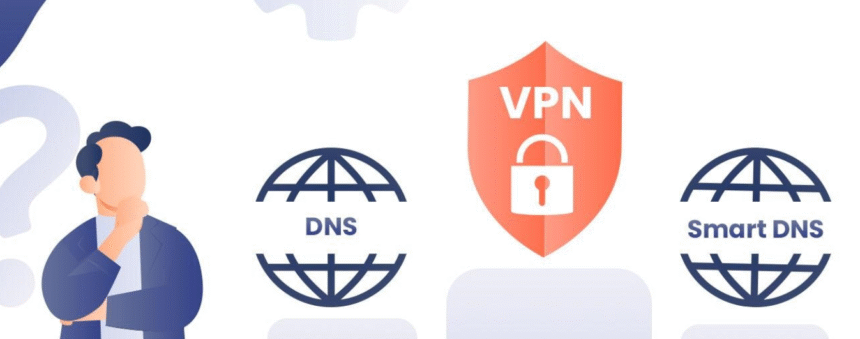American Netflix, Hulu, Peacock, and Max continue to have richer libraries and have releases earlier than their international equivalents. To the international audience, it is no longer a question of whether it is possible to avoid geo-blocks. It is the question of what tool will allow me to get in without compromising my speed or privacy to such an extent that it cripples me.
By 2025, there will be three players, traditional proxy servers, fully encrypted VPNs, and lightweight Smart DNS services. This lean guide distills the clatter into five elaborated categories: how the tools operate, bare-bones performance, privacy risks, actionable advice on making a choice, and a clear-as-crystal verdict, so that you end up with the correct time-saving shortcut to make the most of your binge-watching session tonight.
How Each Tool Works
Before we argue speeds and security, you need a mental model of what’s happening under the hood.
Proxy Servers: Your Minimalist Middleman
At its simplest, a proxy is little more than a relay computer with a U.S. IP address. You point your browser, or, with advanced tinkering, your smart-TV network settings, at that relay. The proxy makes requests to Hulu, grabs the data, and passes it back to you. There’s no encryption by default, which keeps overhead low but exposes everything you do to anyone watching the wire. Cheap and quick, proxies attract users who only care about a single football game or one episode of The Bear before bed. This is the go-to method for casual users trying to access Hulu in Spain without setting up anything more permanent.
VPNs: An Encrypted Tunnel to America
A virtual private network extends the concept. Once you have connected, all your internet traffic, banking logins, and in-game voice chat run in an encrypted capsule to a VPN server in, say, New Jersey. In the view of the streaming platform, the exit point (the server) is your physical location. Newer protocols such as WireGuard and proprietary versions such as Lightway used by ExpressVPN erase most of the speed penalty older VPNs had, and encryption makes snoops and ISPs blind.
Smart DNS: Targeted Deception, No Heavy Lifting
Smart DNS changes only the pieces of information that show your location. When your Apple TV connects to disneyplus.com, the Smart DNS redirects that domain lookup and returns a U.S IP. When Disney+ is sure you are a homegrown viewer, the 4K video feed itself goes directly to your living room, via the closest of Disney content-delivery points, often in the same country you are already in. Speed is native because nothing is encrypted or rerouted following the handshake. The pay-off: no privacy advantage.
In case you are interested in how this differs from VPNs, or need a step-by-step guide based on a different country, this guide https://usa-ip.com/how-to-watch-hulu-in-italy/ provides a practical guide to methods, tools, and restrictions.
Speed, Latency, and Stability Measured Where It Matters
When you want to watch a 4K Dolby Vision, bandwidth is king, but it is not the only parameter of interest. It is latency (the time it takes the first frame to reach you) and long-term reliability when IP blocks are in the way that determines whether your Saturday marathon is sailing or sinking.
Winners and Losers in Real-World Speed Tests
Independent lab AV-Comparatives ran January 2025 benchmarks on a 1 Gbps fiber line in Berlin. Results averaged over ten sessions:
- Smart DNS (Surfshark Smart DNS). 880 Mbps throughput, 42 ms ping to a New York test node.
- Premium VPN (NordVPN WireGuard). 825 Mbps, 68 ms ping.
- Paid Residential Proxy. 540 Mbps, 115 ms ping.
- Free Public Proxy. 60 Mbps, 240 ms ping.
The conclusion is simple: the Smart DNS is as fast as your initial level. The Premium VPNs come second and are equally fit to provide simultaneous 4K streams. Proxies are particularly slow about free proxies, which get jammed after a few hours of posting them in forums.
Stability Under the Hollywood Spotlight
Streaming studios keep expanding blacklists. VPN services respond with constantly changing blocks of residential IP addresses and so-called obfuscation modes that mimic normal HTTPS traffic. The latest 2025 test was used to gauge the general regional Netflix accessibility in 12 regions (including the U.S.) where NordVPN was able to achieve 100 percent success (12/12 regions), compared to ExpressVPN, which was able to work in 9/12 regions.
Smart DNS enjoys a different advantage: because you’re typically using your IP, it’s harder for Disney or Paramount+ to detect the trick, so blocks arrive less frequently. Proxies, however, burn out quickest. Some IPs last only a single weekend before the banhammer swings.
Privacy and Security. A Deal-Breaker for Some, an Afterthought for Others
While everyone craves fast video, not everyone cares, or even realizes, how exposed they can be. Here’s the brutal honesty each method carries.
What Your ISP Sees
- Proxy. Everything, in plain text. Your provider can log domains, streaming titles, and timestamps.
- Smart DNS. Almost everything. Even though the initial location check detours, the rest of your stream is unencrypted and traceable.
- VPN. Practically nothing. Encrypted payloads look like nonsense, and packet inspection tools can’t verify whether you’re streaming, shopping, or emailing.
Data Retention Policies
The best VPNs upgraded to RAM-only servers that wipe upon power-cycle, have annual no-log audits, and post transparent warrant canaries. There is no such scrutiny on proxies, particularly free nodes. DNS lookups may be logged by Smart DNS providers in order to troubleshoot, so it is important to scan the privacy policies.
Beyond Streaming: The Extra Perks
- Bypass ISP throttling on all video traffic (VPN only).
- Shield open Wi-Fi sessions in airports and cafés (VPN only).
- Seamless configuration on locked-down set-top boxes (Smart DNS advantage).
An encrypted VPN tunnel is the privacy winner unless you do not mind sharing your viewing habits, and possibly your credentials, with the world.
Choosing Your Weapon: A Pragmatic Decision Guide
Now that you know how each tool performs, let’s plug that knowledge into real-world scenarios.
The Lightning-Fast Living Room
You have an LG OLED smart TV and an Xbox Series X that do not support easy VPN apps. What you desire is 4K HDR sports with no fiddling when you switch servers. Your obvious choice is Smart DNS. Set up two DNS settings once, reboot, and you are logged into ESPN+ as though you are in Ohio.
The Security-First Road Warrior
You use hotel Wi-Fi on weekdays, paying bills and watching HBO on the same laptop. VPN ticks all the boxes: encrypted banking, no ISP throttling, and constant access to the U.S. catalogs. Seek providers who package Smart DNS in a way that your smart TV back home can continue to perform at full speed, and you remain safe when you are on the move.
The Budget Binger
Money tight? Are you lured by free proxies? Think hidden expenses: glacial pace, random down-time, and the actual possibility of credential theft. Rather, look out for sales of VPN; most of the larger brands have 2−to−3 per month multi-year deals and will frequently include Smart DNS at no extra cost. It is a one-time fee after which you do not remember the geo-blocks throughout your subscription period.
The Hybrid Household
Combined tools are popular with many families: VPN on laptops and phones, Smart DNS hard-coded into the Wi-Fi router DNS settings so all Chromecasts and Apple TVs have Smart DNS automatically. This kind of blueprint is a win-win situation that will soon become standard among 2025 streaming fans.
Verdict: What to Use in 2025 and Why
Smart DNS is king when you don t care about speed and using devices that despise custom applications. As a service it is virtually invisible, and when combined with a VPN subscription, it is free.
Premium VPN is worth every penny when you care about privacy, connect via a public network, or need a catch-all solution that can be used to torrent or evade government firewalls. The security upside is enormous, and performance penalties are insignificant on current fiber or 5G connections.
Proxies, which used to be the hack of first resort, exist primarily as band-aids. They have erratic speeds and no privacy, which makes them a bad long-term choice. Only when you require one episode urgently, and you have no other options.
In the end, intelligent streamers 2025 operate a mixed environment: VPN on personal devices, Smart DNS on shared living-room devices. The combination gives you the entire U.S. library, saves your bandwidth, blocks snooping glances, and no buffering screen is in sight. Therefore, take that remote, fix up your favorite drink, and relax in the comfort of your couch as you watch the best of Hollywood.














